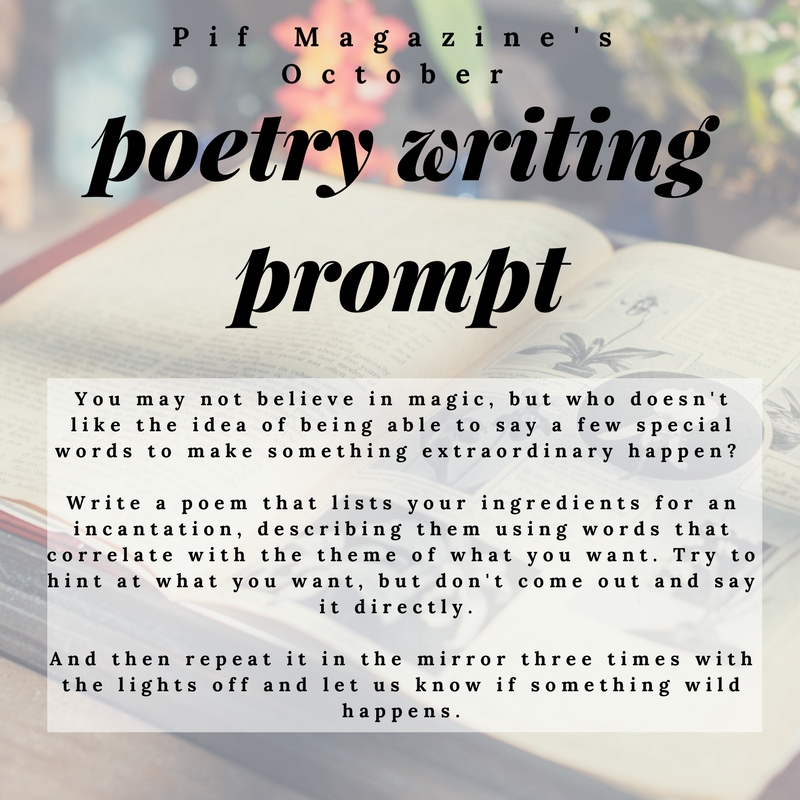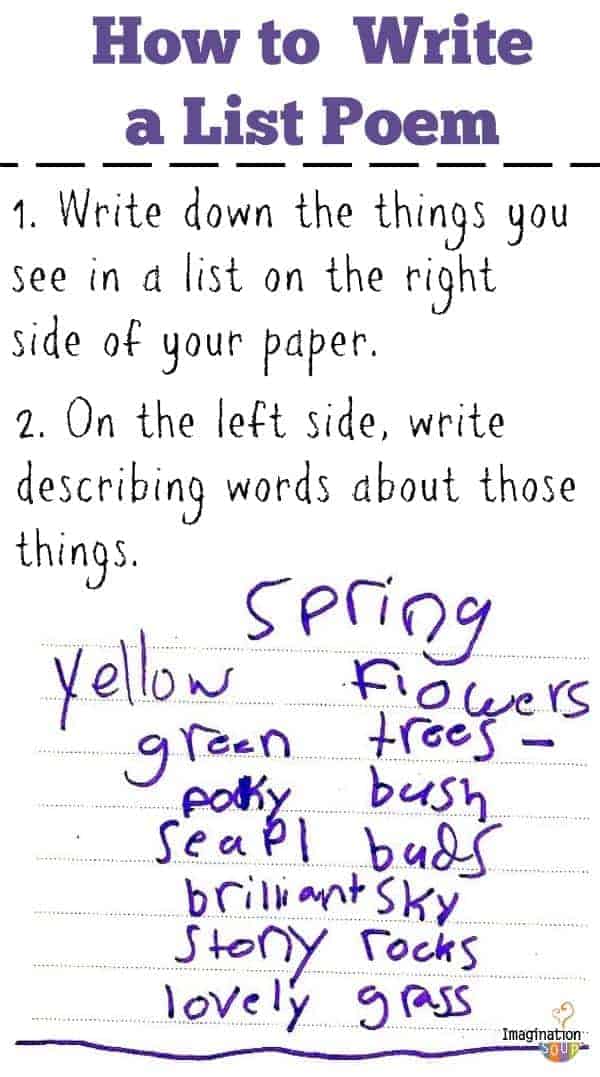
To write a poem, first decide whether you want to follow a specific structure such as a sonnet or haiku, or would prefer to write something free-flowing, then choose a poem type from the selection above. Once you've made your choice, we'll ask you for a few words to inspire your poem How to Write a Poem - Poetry Techniques 1. A step-by-step guide on how to write poetry. Advice on what to write about, how to get started, and choosing the right words. How to Write a Poem - Writing poetry involves not just scribbling in a notebook, but also undertaking a way of life, one in which you value being creative and sensitive. To write good poetry, work to do the following: Discover as much as you can about the poetic craft. Read lots of poetry
How to Write Poetry - Creative Writing Lessons
Last Updated: February 1, References Approved. This article was co-authored by Stephanie Wong Ken, MFA. Stephanie Wong Ken is a writer based in Canada, poem writing. Stephanie's writing has appeared in Joyland, Catapult, Pithead Chapel, Cosmonaut's Avenue, and other publications.
She holds an MFA in Fiction and Creative Writing from Portland State University. There are 17 references cited in this article, which can be found at the bottom of the page, poem writing. wikiHow marks an article as reader-approved once it receives enough positive feedback. This article has 58 testimonials from our readers, earning it our reader-approved status.
This article has been viewed 6, times, poem writing. Writing a poem is about observing the world within or around you. A poem can be about anything, from love to loss to the rusty gate at the old farm. Writing poetry can seem daunting, poem writing, especially if you do not feel you are naturally creative or bursting with poetic ideas. With the right inspiration and approach, you can write a poem that you can be proud to share with others in the class or poem writing your friends.
Brainstorming for Ideas Try a free write. Let your mind wander for minutes and see what you can come up with. Write to a prompt. Make a list or mind map of images. You could also write about something you see right in front of you, or take a walk and note down things you see. Finding a Topic Go for a walk.
Head to your favorite park or spot in the city, or just take a walk through your neighborhood. Use the people you see and nature and buildings you pass as inspiration for a poem. Write about someone you care about.
Recall a special moment you shared with them and use it to form a poem that shows that you care about them. Pick a memory you have strong feelings about. Close your eyes, clear your head, and see what memories come to the forefront of your mind.
Pay attention to what emotions they bring up for poem writing or negative—and probe into those. Strong emotional moments make for beautiful, interesting poems.
Try poem writing New Literary Device Metaphor: This device compares one thing to another in a surprising way. A metaphor is a great way to add unique imagery and create an interesting tone. This can poem writing up abstract ideas or images that are hard to visualize, poem writing.
This is a great tool if you want to play with the way your poem sounds. To write a poem, start by picking a theme or idea you want to write about, like love or grief. Then, try to come up with creative metaphors to describe your theme or idea. For example, instead of writing "Love feels good," you could write "Love spread through my heart like a wildfire. Try to go outside and look for objects, or go somewhere where you might find inspiration for your poem.
For help choosing a structure for your poem, like a haiku, poem writing, limerick, or sonnet, read the article! Did this summary help you? Yes No. Log in Social login does not work in incognito and private browsers. Please log in with your username or poem writing to continue. wikiHow Account, poem writing.
No account yet? Create an account. Community Dashboard Write an Article Request a New Article More Ideas Edit this Article. Courses New Tech Help New Poem writing Videos About wikiHow Pro Upgrade Sign In. Home Random Browse Articles Courses New About wikiHow Easy Ways to Help Approve Questions Poem writing Spelling Quiz App More Things to Try We use cookies to make wikiHow great. By poem writing our site, you agree to our cookie policy. Cookie Settings. wikiHow is where trusted research poem writing expert poem writing come together, poem writing.
Learn why people trust wikiHow. Categories Education and Communications Studying Subjects English Poetry Writing Poetry How to Write a Poem.
Download Article Explore this Article parts. Sample Poems. Tips and Warnings. Related Articles. Article Summary. Co-authored by Stephanie Wong Ken, MFA Last Updated: February 1, References Approved. Sample Poems Sample Limerick. Support wikiHow and unlock all samples. Sample Cinquain. Part 1 of Do writing exercises.
A poem might start as a snippet of a verse, a line or two that seems to come out of nowhere, or an image you cannot get out of your head. You can find inspiration for your poem by doing writing exercises and using the world around you. Once you poem writing inspiration, you can then shape and mould your thoughts into a poem.
Get inspired by your environment and those close to you. Pick a specific theme or idea. You can start your poem writing by focusing on a specific theme or idea that you find fascinating. Picking a specific theme or idea to focus on in the poem can give your poem a clear goal or objective. This can make it easier for you to narrow down what images and descriptions you are going to use in your poem, poem writing. Choose a poetic form. Get your creative juices flowing by picking a form for your poem.
There are many different poetic forms that you can use, from free verse poem writing sonnet to rhyming couplet. Read examples of poetry. To get a better sense of what other poets are writing, poem writing, you may look through examples of poetry.
You may read poems written in the same poetic form you are interested in or poems about themes or ideas that you find inspiring. Part 2 of Use concrete imagery. Avoid abstract imagery and go for concrete descriptions of people, places, and things in your poem.
You should always try to describe something using the five senses: smell, taste, poem writing, touch, sight, and sound. Include literary devices. Literary devices like metaphor and simile add variety and depth to your poetry. Using these devices can make your poem stand out to your reader and allow you to paint a detailed picture for your reader, poem writing. Try to use literary devices throughout your poem, varying them so you do not use only metaphors or only similes in your writing.
Write for the ear. Poetry is made to be read out loud and you should write your poem with a focus on how it sounds on the page. Writing poem writing the ear will allow you to play with the structure of your poem and your word choice. Notice how each line of your poem flows into one another and how poem writing one word next to another creates a certain sound.
Avoid cliche. Your poetry will be much stronger if you avoid cliches, which are phrases that have become so familiar they have lost their meaning. Go for creative descriptions and images in your poem so your reader is surprised and intrigued by your writing. If you feel a certain phrase or image will be too poem writing to your reader, replace it with a more unique phrase.
Part 3 of Read the poem out loud. Once you have completed a draft of the poem, you should read it aloud to yourself. Notice how the words sound on the page. Pay poem writing to how each line of your poem flows into the next, poem writing.
How to Write a Poem
, time: 8:08How to Write a Poem: 8 Fundamentals for Writing Poetry That's Meaningful

How to Write a Poem - Poetry Techniques 1. A step-by-step guide on how to write poetry. Advice on what to write about, how to get started, and choosing the right words. How to Write a Poem - Writing poetry involves not just scribbling in a notebook, but also undertaking a way of life, one in which you value being creative and sensitive. To write good poetry, work to do the following: Discover as much as you can about the poetic craft. Read lots of poetry To write a poem, first decide whether you want to follow a specific structure such as a sonnet or haiku, or would prefer to write something free-flowing, then choose a poem type from the selection above. Once you've made your choice, we'll ask you for a few words to inspire your poem

No comments:
Post a Comment